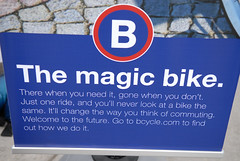With their recent launch of 500 bikes and 50 kiosks, Denver is now home to the largest bike-sharing system in the United States. Bike-sharing has yet to catch fire in the U.S. like it has in Europe, so Denver’s foray will be watched closely by other U.S. cities, like Portland, that have shown interest in the concept.
It’s been over three years since Mayor Sam Adams (who was a commissioner back then) first launched an effort to bring a similar system to Portland. Since then, Portland officials have done quite a bit of thinking and planning: They’ve visited other countries to research bike-sharing systems; they’ve come close to choosing a vendor (then canceled their search altogether); they invited some of the top bike-sharing companies in North America (including B-cycle) to a demonstration event; and they launched a survey to gauge public interest.
“MP3 players had been around for years in obscurity before Apple made it a must-have addition to the lives of millions. Maybe Denver will be America’s iPod of bike share programs.”
— Tom Miller, Chief of Staff for Mayor Sam Adams
With the big news in Denver, I wondered if Portland was perhaps thinking of putting the idea back on the front-burner. Denver’s partnership with B-cycle is the largest and most legitimate bike-sharing roll-out in the United States. The success or fail of the system there could have major ramifications on bike-sharing plans in other cities.
Or, as one source close to the Denver’s plans told me recently, “Everyone interested in bike sharing and urban cycling has to be watching Denver. If bike sharing falters there, that will not bode well for other places.”
Mayor Sam Adams’ Chief of Staff Tom Miller (who wrote a six-part series on bike-sharing for us back in 2008) says they’re unswayed by Denver’s move. When I asked him for an update earlier this week, he said, “Portland doesn’t create policy or programs to ‘keep up with the neighbors.'”
Miller says the Mayor’s office sees bike share in a “broader context” of how best to provide choices to Portlanders beyond our “near-monopolistic reliance on the private automobile for everyday travel needs.”
Miller points out that a key difference between Portland and Paris — a place where bike-sharing took off like wildfire — is population density. The more densely people live, Miller explained, the shorter the average trip length and “the more viable a bicycle becomes.”
In Paris there are 49,000 people per square mile while in Portland we’ve got just 4,200 (a bit higher than Denver’s 3,700).
But density isn’t the only factor according to Miller’s analysis. For a program to be successful, Miller maintains that the provider/vendor must know the local culture and lay of the land (geographically):
“You also have to know whether a three-speed bike is enough to get your middle-aged neighbor up Interstate or Mississippi to North Portland from the central city. Alternatively, does a bike become too expensive to maintain if it must have seven speeds or more to account for local topography?”
Miller barely touched on cost, but it’s the one factor perhaps looming largest in his office’s mind. With the failure of Portland’s attempt at free public Wi-Fi still fresh in City Hall’s memory, Mayor Adams wants a system that uses no public money. Portland also has a city ordinance that puts limits on advertising in the public right-of-way. Those constraints make it very difficult (impossible?) to find a vendor that can make a bike-sharing system in Portland financially feasible.
Ad giant JC Decaux saturated Paris with kiosks and public bikes because of the huge advertising presence it gave them. The company didn’t even respond to Portland’s call for vendors.
In Denver, this big roll-out is only possible because the political and funding stars have aligned. Start-up costs were offset with $1 million from the 2008 Democratic National Convention Host Committee surplus fund and the project was an easy sell because of the success of the Freewheelin’ bike share program during the conventions. Add in the 100% support from Denver’s Mayor and a smattering of grants and private funding commitments, and you’ve got a perfect political and financial storm.
According to a source, Denver’s B-cycle system is now run by a 501c3 organization that has raised a total of $2.2 million. Costs for a bike-sharing system from a top-notch vendor is around $3,500 to $5,000 per bike. One expert I spoke with said a 500 bike system would require “at least” $2.5 million in start-up costs.
Given the political and public heat Mayor Adams has come under for the 2030 Bike Plan and for his recent $20 million BES/PBOT/green streets idea, it’s easy to see why he’s not pushing forward on bike-share. If they make a move, it would come with significant financial and political risk.
But whether it’s politics, population density, or price, Miller says it comes down to finding the right business model and they haven’t completely given up on the idea:
“While Portland has decided to observe rather than engage, we’re not abandoning hope either. MP3 players had been around for years in obscurity before Apple made it a must-have addition to the lives of millions. Maybe Denver will be America’s iPod of bike share programs. We hope so because Portland will be an early adopter.”




